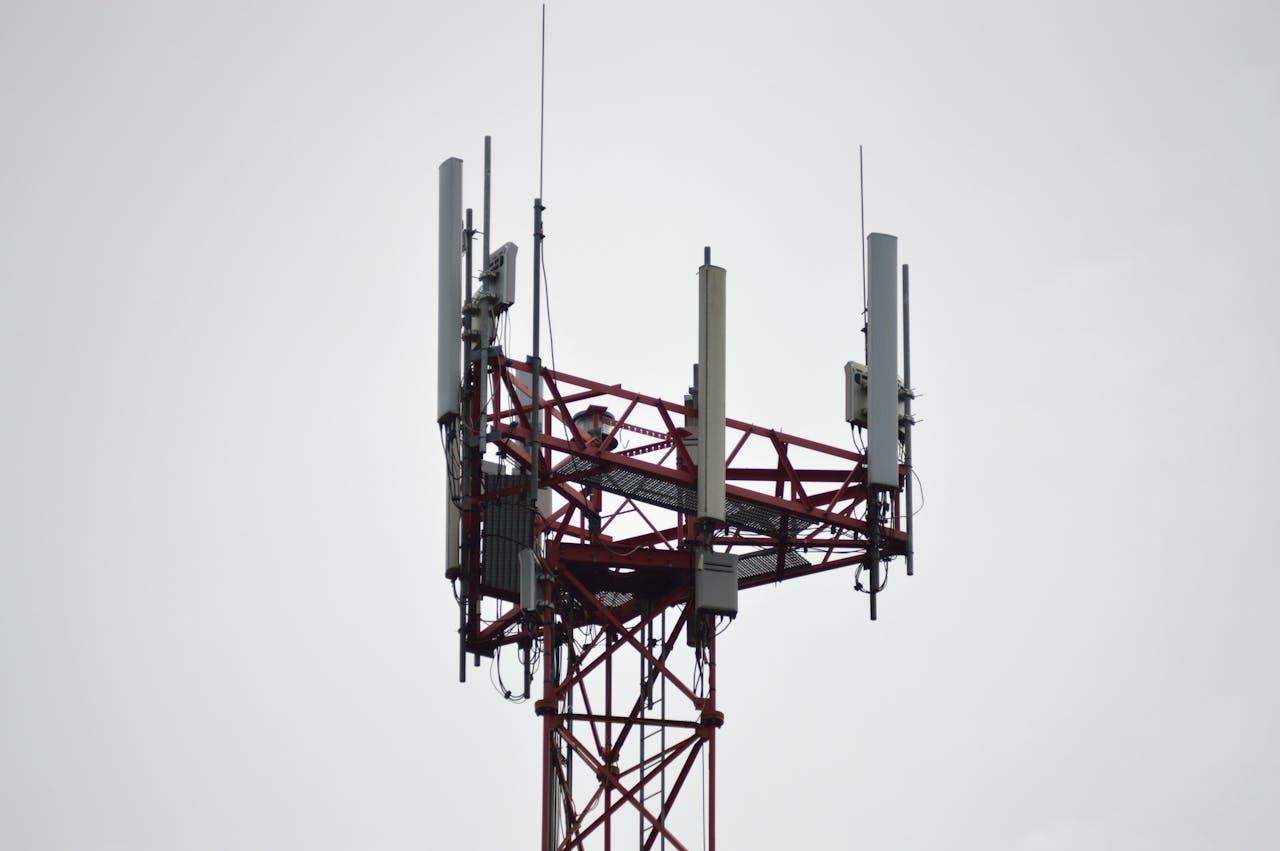Broadband Connection and Its Alternatives
-
April 23, 2024
-
7 min read

High-speed internet connectivity is of utmost importance for businesses of all types and sizes. Medium and large-scale businesses can’t afford outages that hold them back. Broadband refers to high-speed internet access, enabling faster downloads, uploads, and streaming compared to dial-up connections. It’s the “always on” internet powering today’s online activities. Broadband enables everything from video conferencing to cloud storage. Unlike dial-up’s crawl, broadband lets you upload and download quickly and boosts productivity and innovation.
A leased line broadband contention refers to sharing internet bandwidth with other subscribers on the network. High contention can slow speeds during peak usage. Businesses can consider alternatives like leased lines, satellite connections, etc. They offer a dedicated, uncontended connection for maximum performance. Leased lines are ideal for critical business functions.
Explore these options to ensure your internet supports your company’s needs. Keep reading to learn how to optimize this essential resource for your business.
Alternatives for broadband
Before diving into the list of alternatives for broadband, find out the reasons for opting for an alternative.
While conventional broadband technology offers significant advantages, there are situations where alternatives might be better. Here’s why:
- Limited availability: Broadband infrastructure has limited availability. Rural areas or remote locations might have spotty or non-existent service.
- Speed and performance: Broadband can suffer during peak usage times due to contention (sharing bandwidth). For businesses that need consistent, high speeds, an alternative might be required.
- Cost: Broadband plans can vary significantly. If budget is a major concern, exploring alternative options might be worthwhile.
There are situations where broadband is the clear winner, but understanding these limitations can help businesses choose the best fit for their needs.
Let us now explore some alternatives that can outperform broadband and meet your business requirements efficiently.
1. Leased line connection
Consider a leased line connection if your business is heavily reliant on internet connectivity. Unlike traditional broadband with shared network infrastructure, a leased line offers a dedicated, private connection. This translates to several key benefits:
- Unmatched speed and performance: Leased lines boast symmetrical speeds. This means upload and download rates are equally impressive. This is crucial for businesses transferring large files or conducting video conferences.
- Unwavering reliability: Experience seamless streaming and uninterrupted communication. Leased lines prioritize uptime. They ensure a consistent and dependable internet connection for critical operations.
- Enhanced security: Leased lines create a private pathway for your data. This minimises the risk of unauthorised access compared to shared broadband connections, which is ideal for businesses handling sensitive information.
- Scalability: Your bandwidth needs can evolve. Leased lines offer flexible upgrade options to ensure connection keeps pace with the growing business demands.
While leased lines come with a higher cost compared to traditional broadband, the reliability, security, and guaranteed performance can be well worth it for businesses. This is especially true for businesses that depend on a seamless online experience.
2. Satellite Internet Connection
For remote locations lacking traditional broadband options, satellite internet offers a lifeline to connectivity. It beams data signals between your dish and orbiting satellites. It provides internet access in far-flung areas. However, keep in mind these trade-offs:
- Latency: Due to the vast distances involved, satellite internet experiences higher latency (delay) compared to other options. This can impact real-time applications like video conferencing.
- Weather dependence: Signal quality can fluctuate with heavy rain or storms.
- Data caps and speeds: Data usage often comes with caps, and speeds can be slower than broadband, impacting data-heavy tasks.
Despite these limitations, satellite internet connection remains a valuable option for connecting in underserved areas. It bridges the gap until terrestrial options become available.
3. Fixed wireless internet
When businesses need internet access but traditional options are out of reach, fixed wireless offers a potential solution. It utilises cellular towers or base stations to transmit high-speed internet signals directly to an antenna at your location. Some key features include:
- Faster speeds and broader coverage: Compared to satellite internet, fixed wireless offers potentially faster speeds. It can cover wider areas without requiring a physical cable connection.
- Quick installation: Setting up fixed wireless is often faster than traditional options like buried cable lines.
- Cost-effective: Fixed wireless can be a more cost-effective solution than leased lines, particularly in areas with existing cellular infrastructure.
However, potential drawbacks like reliance on line-of-sight to the transmitter and potential throttling during peak usage times should be considered. Explore fixed wireless as a possible alternative for connecting your business, especially in locations with limited broadband reach.
4. Mobile broadband
Mobile broadband keeps businesses connected. It utilises cellular networks similar to your smartphone. This is to provide internet access to laptops and tablets. Some key features of mobile broadband include:
- Flexibility and mobility: It allows users to work from anywhere with a cellular signal. It is perfect for remote workers or those needing real-time connectivity on the move.
- Convenience: It leverages existing cellular infrastructure. It potentially eliminates installation hassles.
- Data usage: Be mindful of data caps, which can limit heavy tasks like video streaming.
Mobile broadband offers a convenient way to stay connected. However, data limitations and potentially slower speeds compared to fixed options are factors to consider.
5. Fibre optic internet
For businesses seeking the ultimate internet performance, fibre optic internet stands out. This technology transmits data using light pulses travelling through hair-thin glass fibres. Here’s why it might be the ideal choice for your business:
- Blazing seeds: Fibre optics boast symmetrical speeds, which implies that upload and download rates are equally impressive. This translates to lightning-fast file transfers, smooth video conferencing, and seamless cloud storage access.
- Unparalleled reliability: Fibre optic cables are less susceptible to interference and weather compared to traditional copper wires. This translates to a highly reliable connection with minimal downtime.
- Future-proof technology: Fibre optic’s immense bandwidth capacity accommodates future growth and emerging technologies with high data demands.
Fibre optic installation might require an upfront investment. However, the long-term benefits of unparalleled speed, reliability, and future-proofing can be a game-changer for businesses. This is specifically for businesses that rely heavily on online operations.
6. Hybrid solutions
Businesses can consider combining internet solutions for improved connectivity. Hybrid options bring together two or more connection types, like cable and DSL, for a dynamic approach. This offers:
- Redundancy: If one connection fails, the other keeps your business online. It minimises downtime and ensures critical operations continue.
- Load balancing: Traffic can be distributed across connections, optimizing overall speed and performance, especially during peak usage times.
- Cost optimization: By combining a high-speed option for critical tasks with a more cost-effective one for everyday use, you can potentially achieve an optimal balance between performance and budget.
Explore hybrid solutions to tailor your internet access to your business’s specific needs and budget.
Which connection is the best for your business?
Choosing the right internet connection for your business depends on your specific needs. While broadband provides a reliable base, it’s important to explore other options as well. Business Leased lines provide unmatched speed and security for critical operations.
Fixed wireless or mobile broadband excels in remote areas or for on-the-go access. Fibre optic delivers the ultimate speed and reliability for data-intensive businesses. Hybrid solutions combine options for redundancy and cost-effectiveness.
Evaluate your priorities – speed, reliability, budget, and location – to find the best fit.
Stay connected and make your business thrive
Business success today depends on many factors, and an efficient office internet connection is essential for achieving it. Understanding the strengths and limitations of broadband and its alternatives can help businesses make informed decisions to optimize their online performance and stay competitive.
To stay connected and steer away from the hassles of downtimes, Airtel Leased Lines can be a smart option.
 Share
Share









